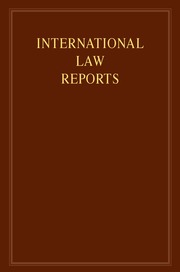No CrossRef data available.
Article contents
Jorgic v. Germany
Published online by Cambridge University Press: 01 January 2021
Abstract
Human rights — Right to a fair trial — Right to liberty and security — Admissibility of applicant's complaint — Whether applicant's case heard by tribunal established by law under Article 6(1) of Convention — Whether German courts having reasonable grounds for establishing jurisdiction to try applicant for genocide — Articles 6(1) and 220a of Criminal Code — Whether public international law rule prohibiting applicant's conviction for genocide by German courts — Whether applicant lawfully detained after conviction by a competent court under Article 5(1) of Convention — Whether Germany violating Article 6(1) or 5(1) of European Convention on Human Rights, 1950
Jurisdiction — Universal — Article 6(1) of German Criminal Code codifying public international law principle of universal jurisdiction — Article 220a of Criminal Code — German courts trying applicant on charges of genocide committed outside Germany — Whether complying with international law provisions applicable in Germany — Interpretation of Article VI of Genocide Convention — Whether German courts having reasonable grounds for establishing jurisdiction
Relationship of international law and municipal law — Genocide Convention, 1948, Articles I, II and VI — German Criminal Code, Articles 6(1) and 220a incorporating Genocide Convention into German law — Interpretation of Article VI of Genocide Convention by German courts — Whether reasonable — Statutory provisions and case-law of other Contracting States to Convention — Statute and case-law of International Criminal Tribunal for the Former Yugoslavia
Human rights — Right to a fair trial — Admissibility of applicant's complaint — Assessment of evidence and its relevance — Appropriateness of calling witnesses — Application of Article 244 of Criminal Code by German courts — Refusal to call certain witnesses, inspect purported crime scene or have topographical map drawn up — Whether violation of full equality of arms principle — Whether rendering proceedings against applicant unfair as a whole — Whether German courts acting arbitrarily — Courts’ finding that applicant's guilt of particular gravity — Whether Germany violating Article 6(1) and (3)(d) of European Convention on Human Rights, 1950
Human rights — No punishment without law guarantee — Admissibility of applicant's complaint — Whether acts committed by applicant constituting criminal offence under German or international law at time of commission — Whether German courts’ wide interpretation of crime of genocide consistent with essence of offence — Whether reasonably foreseeable by applicant — Article 220a of Criminal Code — Whether intent to destroy group in physical or biological sense necessary — German courts’ finding that applicant's guilt of particular gravity — Whether Germany violating Article 7 of European Convention on Human Rights, 1950
International criminal law — Genocide — Definition — Interpretation — Article II of Genocide Convention, 1948 — Article 220a of German Criminal Code — German courts interpreting crime of genocide widely — Whether interpretation having basis in German or public international law — Whether consistent with essence of offence — Whether risk of charge and conviction of genocide reasonably foreseeable by applicant at material time — Whether necessary to intend to destroy group in physical or biological sense — German courts’ wider interpretation supported by scholars and United Nations General Assembly Resolution 47/121 — Subsequent case-law of national and international courts, notably International Criminal Tribunal for the Former Yugoslavia and International Court of Justice, supporting narrower interpretation — Relevance for applicant
Keywords
- Type
- Case Report
- Information
- Copyright
- © Cambridge University Press 2012


